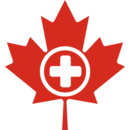Health and Welfare Canada
The Department of National Health and Welfare (NHW), commonly known as Health and Welfare Canada, was a Canadian federal department established in 1944.
Its advisory body on welfare was the National Council of Welfare.[1] In June 1993, Prime Minister Kim Campbell split the department into two separate entities: Health Canada[2] and Human Resources and Labour Canada (later Human Resources Development Canada).[1]
History[]
| Part of a series on |
| Healthcare in Canada |
|---|
 |
| Health Canada |
| History of medicine |
| Topics |
| Canada portal |
Canada's original Department of Health was created in 1919. It would merge with the Department of Soldiers' Civil Re-establishment in 1928 to form the Department of Pensions and National Health. Soon after, the Department of National Health and Welfare would be established in 1944.[3]
In June 1993, Prime Minister Kim Campbell split the department into two separate entities: the portfolio related to health would form Health Canada,[2] while social-development and income-security programs (i.e., the 'welfare' side) would form Human Resources and Labour Canada[1]—which also combined Labour Canada, the employment programs of Employment and Immigration Canada, and the social-development and education programs from the Secretary of State.[4] Within a few months, a new government was elected, after which Human Resources and Labour became known as Human Resources Development Canada.
Ministers of Health and Welfare[]
| No. | Minister | Term | Ministry |
|---|---|---|---|
| 1. | Brooke Claxton[5] | October 18, 1944 - December 11, 1946 | under Prime Minister William Lyon Mackenzie King |
| 2. | Paul Martin Sr. | December 12, 1946 - November 15, 1948 | |
| November 15, 1948 - June 20, 1957 | under Prime Minister Louis Stephen St. Laurent | ||
| * | Alfred Johnson Brooks (Acting) | June 21, 1957 - August 21, 1957 | under Prime Minister John Diefenbaker |
| 3. | Jay Waldo Monteith | August 22, 1957 - April 21, 1963 | |
| 4. | Judy LaMarsh | April 22, 1963 - December 17, 1965 | under Prime Minister Lester Bowles Pearson |
| 5. | Allan MacEachen | December 18, 1965 - April 19, 1968 | |
| April 20, 1968 - July 5, 1968 | under Prime Minister Pierre Elliott Trudeau | ||
| 6. | John C. Munro | July 6, 1968 - November 26, 1972 | |
| 7. | Marc Lalonde | November 27, 1972 - September 17, 1977 | |
| 8. | Monique Bégin | September 18, 1977 - June 3, 1979 | |
| 9. | David Edward Crombie | June 4, 1979 - March 2, 1980 | under Prime Minister Joe Clark |
| Monique Bégin (2nd time) | March 3, 1980 - June 29, 1984 | under Prime Minister Pierre Elliott Trudeau | |
| June 30, 1984 - September 16, 1984 | under Prime Minister John Turner | ||
| 10. | Jake Epp | September 17, 1984 - January 29, 1989 | under Prime Minister Brian Mulroney |
| 11. | Perrin Beatty | January 30, 1989 - April 20, 1991 | |
| 12. | Benoît Bouchard | April 21, 1991 - June 24, 1993 | |
| 13. | Mary Collins | June 25, 1993 - November 3, 1993 | under Prime Minister Kim Campbell |
| 14. | Diane Marleau | November 4, 1993 - January 24, 1996 | under Prime Minister Jean Chrétien |
| 15. | David Dingwall | January 25, 1996 - July 11, 1996 |
See also[]
- Healthcare in Canada
- Welfare in Canada
References[]
- ^ Jump up to: a b c https://web.archive.org/web/20120505032106/http://canadiansocialresearch.net/welref.htm
- ^ Jump up to: a b https://web.archive.org/web/20070807064127/http://www.amherstburg-cs.com/seniorserv.htm
- ^ Cheung-gertler, Jasmin H. 2008 November 26. "Health Canada." The Canadian Encyclopedia (last updated 2014 August 5).
- ^ "Human Resources Development Canada Sustainable Development Strategy II." Human Resources Development Canada. 2004 March 10.
- ^ "Brian Brooke Claxton | The Canadian Encyclopedia". www.thecanadianencyclopedia.ca. Retrieved 2021-01-24.
Further reading[]
- Health and Welfare Canada and Department of Finance. 1982. Better Pensions for Canadians (green paper).
- Collishaw, Neil. 2009. "History of tobacco control in Canada." Physicians for a Smoke-Free Canada.
- National Capital Alliance on Race Relations vs. Canada (Health and Welfare): A Case Study
- https://web.archive.org/web/20120505032106/http://canadiansocialresearch.net/welref.htm
- https://web.archive.org/web/20130524112429/http://www.statcan.gc.ca/pub/11-516-x/sectionc/4057749-eng.htm
- Ministries established in 1944
- Canada government stubs
- Former Canadian federal departments and agencies